Marcelo Bielsa: The manager behind the myths - what is it really like to work with him?
- Published

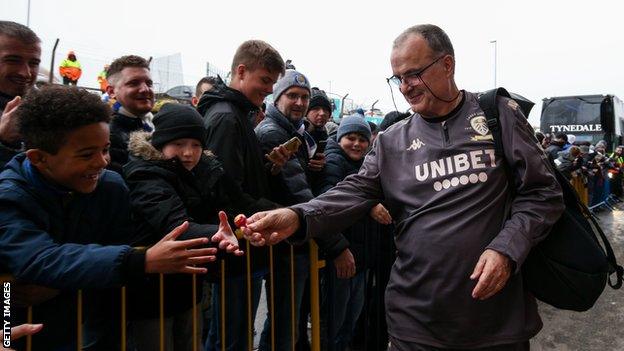
Pictured here handing out sweets, Bielsa is a hugely popular figure among Leeds fans
Maybe you've heard the one about Marcelo Bielsa threatening his own team's supporters with a hand grenade. Or how he took Argentina to the 2002 World Cup armed with 2,000 video tapes on their opponents.
What about the time he told his keeper to boot the ball out of play from every goal kick because he thought the other side were vulnerable from their own throw-ins?
Bielsa is a meticulous, obsessive and enigmatic manager who carries a mythology with him. He is one of football's most intriguing personalities - and he has just arrived in the English Premier League.
According to some of his former players, not one of those three stories about him is actually true. Yet these far-fetched tales are still widely believed because they are entirely in keeping with a man who has not so much torn up the coaching manual as put it through a shredder and stuck it back together again - and done so in a way that makes sense to him and an army of disciples that can count Pep Guardiola and Mauricio Pochettino among their number.
In our BBC World Service documentary - Bielsa: the manager behind the myths - we've spoken to some of the people who have got closest to the 65-year-old Argentine through his well-travelled career - from Buenos Aires to Bilbao and Mexico to Marseille - to try to find out what it is really like to work with this famously idiosyncratic and demanding coach.
As his exciting Leeds United team prepare to take on the Premier League, it makes for a revealing portrait of a fascinating but flawed character who is embarking on a tantalising new chapter in his career.

Bielsa hails from Rosario, capital of the Argentine province of Santa Fe, the middle child in a high-achieving family of politicians, lawyers and diplomats.
But while his brother and sister followed family tradition by pursuing careers in law and politics - his brother Rafael is Argentina's ambassador to Chile - Bielsa became a student of football, dispatching his mother to the newsagents every day to gather up all the sports papers and magazines.
Despite briefly making the first team at Newell's as a player himself, he soon realised that his physical limitations but agile mind made him more suited to coaching. He quit playing at the age of 25 and after a spell in charge of the University of Buenos Aires team he took over the youth academy at Newell's, developing a forensic approach to scouting players that serves him to this day.
"In Argentina, football teams are always looking in every slum, in every park, in every playground, hoping to find the next Messi, Maradona or Batistuta. But what Bielsa did, in typical Bielsa style, was to become incredibly meticulous and organised about it," says Argentine football writer Marcela Mora y Araujo.
"So he and his fellow youth team coach Jorge Griffa divided the country into 70 territories, driving thousands of miles in Bielsa's little Fiat. If they liked a player, they would go and see them, no matter what time it was.
"When Pochettino was 12 years old, Bielsa turned up at his family home at 2am and told his mother he was very interested in signing him up. The mother walked him to the bedroom but Pochettino was asleep. Bielsa said: 'Don't worry, I don't need to talk to him, I just need to see his legs.'"
Pochettino and his fine footballing legs went on to become a key pillar of the Newell's team that won two Argentine championships under Bielsa. One of his team-mates in that celebrated team - Ricardo Lunari - recalls being scouted by Bielsa after scoring a hat-trick for his local team in 1985.
"After the game, Marcelo approached my dad and asked him to enlist me to play at Newell's," says Lunari.
"He really drew my attention. I was surprised by his intensity and way of talking passionately about football. He didn't just speak with his mouth: he spoke with his hands and his body. I thought: 'who is this man?'"
It wasn't long before Lunari was being subjected to the arduous training methods that have become another Bielsa trademark.
"It was a huge change for us 15- or 16-year-old boys who were used to playing mostly for fun," says Lunari. "We were used to training for an hour and a half, but with Marcelo we trained for three hours with a level of concentration and physical intensity that we were not used to.
"It was very difficult for us to follow Marcelo's deep thinking."
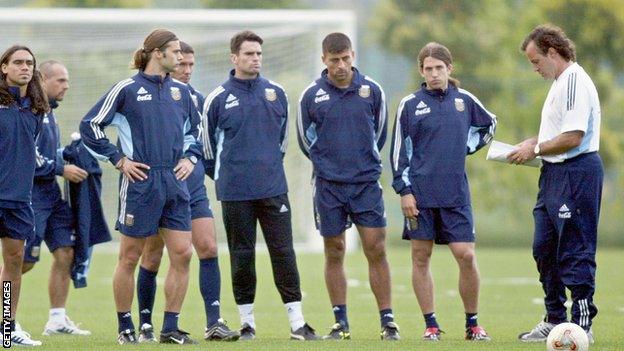
Bielsa instructing his Argentina players, including Mauricio Pochettino and Diego Simeone, before facing England at the 2002 World Cup, where they were knocked out at the group stage
Pushing young players to their physical and mental limits has been a theme throughout Bielsa's career. At Leeds, players compete in 'murderball', a high-intensity 11-a-side match where the ball never goes out of play.
Former Mexico midfielder Pavel Pardo remembers Bielsa's delight at watching his young charges push through the pain barrier at Atlas Guadalajara, where he coached after leaving Newell's in 1993.
"He has a book of training drills and in the whole time we were with him we never once repeated a drill," says Pardo, who won 146 caps for his country. "After a drill, we would meet in the middle of the field and we could hardly breathe. He would be really happy to see us like that."
Under Bielsa, match preparation does not finish at the training ground. Lunari and Pardo were sent home with videos of rival teams and asked to present their observations on line-ups, tactics and set-piece routines. During the wedding of Newell's defender Dario Franco, Bielsa took the squad to a room in the hotel to watch their next opponent's previous game.
From February 2019: Inside Marcelo Bielsa's Leeds
It's not hard to see how Bielsa earned the nickname 'El Loco'. When it comes to this most unorthodox of managers it is always wise to expect the unexpected.
"One day we turned up for training and Bielsa was nowhere to be seen," says Lunari. "We heard his screams, his instructions, but we couldn't find him. Then suddenly someone spotted him. He was up a tree looking for the best view of our training."
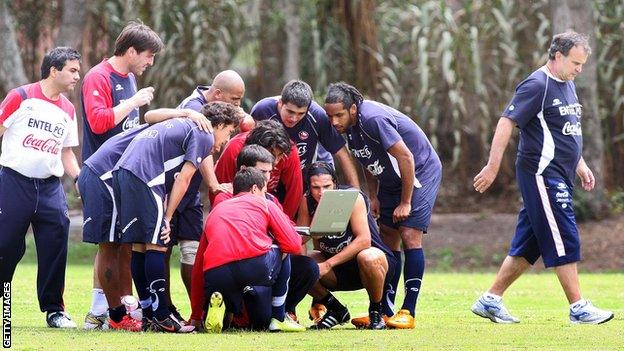
Chile players huddle around a laptop during training for a 2010 World Cup qualifying match - they were knocked out by Brazil in the last 16
Throughout his 30 years as a manager, Bielsa's methods have helped players scale new heights. Leeds fans have delighted in the dramatic improvements of players such as Mateusz Klich, captain Liam Cooper and Kalvin Phillips, who made his England debut in Denmark on Tuesday.
Spain striker Aritz Aduriz, who spent a season under Bielsa at Athletic Bilbao, credits the Argentine's coaching for the remarkable late-career blossoming that saw him score 104 of his 158 La Liga goals after the age of 30.
"Without any doubt that's the year I improved the most as a football player, because his huge level of demand makes you perform at the highest level," says Aduriz.
"As a man, he demands very high performances of himself and his team, so you have to be alert every second. Every moment matters in every training session - every first touch, every strike, anything that happens is scrutinised and that makes you really aware in every training session.
"His coaching style, always in contact with the ball, eventually makes you feel really confident and makes you improve how you play the ball. His way of looking at each detail and being able to analyse the tiniest movement in a match and reflect on it afterwards makes you improve a lot."
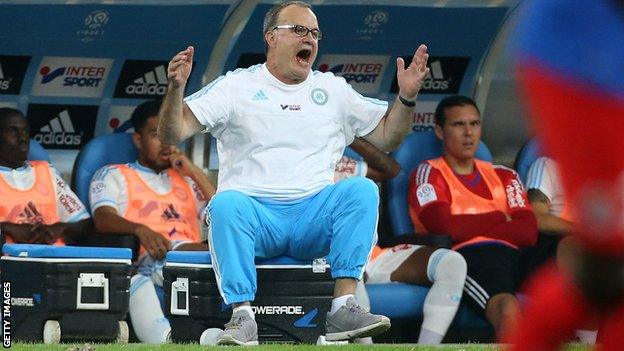
After leaving Marseille in 2015, Bielsa joined Lazio in 2016 but resigned after two days, before returning to management in France with Lille in 2017 where he lasted only six months
Bielsa has a proven track record of instant results and short-term gains, but it has often been said that his draining routines leave players burnt out in the final push for silverware.
In his first season in Bilbao, Bielsa's team reached the finals of the Europa League and Copa del Rey, only to suffer 3-0 defeats at the hands of Atletico Madrid and Barcelona respectively. At Marseille in 2014-15, Bielsa's team were top of Ligue 1 at Christmas, but faded badly and finished fourth.
"We were exhausted," says defender Rod Fanni. "Mentally, it's very difficult to repeat the same things every day. You have to be strong because it's a bit like a factory. You go there, you repeat, you repeat, you repeat and you go home.
"When it's every day, every day for a year, believe me it's not easy."
According to Fanni, Bielsa's nickname at Marseille was 'le professeur', hinting both at his status at a footballing intellectual but also at a man-management style that maintains a distance between the coach and his players.
"You don't say hello to him a lot or greet him a lot," adds Fanni. "I think I've only greeted him twice in my life. That shocks people - it gives the impression of someone who's a monster but he's not one at all, it's just the way he is."
When Lunari arrived at Atlas having been signed by Bielsa from Universidad Catolica in Chile, the first thing the manager told him was that he wasn't worth the $1m the club had paid for him. Aduriz tells a similar story about joining Athletic Bilbao before Bielsa's second season in charge.
"The first day I met him, with his usual bluntness he told me that he hadn't requested any reinforcements in attack, that it had been the club who had taken the decision to sign me," Aduriz explains.
"I believe that it was a way to check how committed I was to the team. At least I saw that he was never going to lie to me. He was a very frank man."
Pardo believes Bielsa's aloofness towards players may explain a modest trophy haul of three Argentine league championships, one Olympic gold medal and the Championship title with Leeds. Some players, says the Mexican, need their manager to show them some love.
"In my opinion, Klopp, Guardiola and Zidane are probably friendlier with the players," he says. "Marcelo Bielsa convinces the player about the system and gives us the tools, but the relationship we have as people needs to be close. He thinks players are machines, but we are humans as well."
It is revealing that Lunari, who was Bielsa's assistant during a thrilling spell in charge of the Chile national team between 2007 and 2011, says he would be unwilling to work with the Argentine manager again.
"I don't have the intensity you need to be by his side," says Lunari. "I am passionate about football, but I am not thinking about the game 24 hours a day, and I believe that to be working next to him, one needs to have a special type of dedication.
"I am not willing to do it. I think that it would not be healthy, neither for him nor for me, to work together. I prefer to continue admiring and appreciating his football but from the outside."
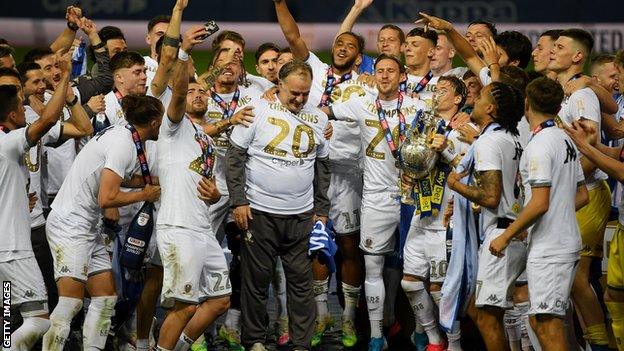
Leeds are returning to the Premier League for the first time since their relegation from England's top flight in May 2004
There has certainly been plenty to admire and appreciate during Bielsa's tenure at Leeds.
After missing out on promotion during a season derailed by the 'Spygate' scandal, they maintained focus through the Covid-19 shutdown and secured their Premier League status with two games to spare, sweeping aside most opponents with their possession-based style.
Are we perhaps witnessing a veteran manager learning from his past mistakes?
"It's Bielsa's rigidity that works against him and after the first season we all thought: 'There goes Bielsa again, almost but not quite,'" says Mora y Araujo. "But now he has done it, and I think that's incredibly redeeming for him personally and for the club."
Bielsa certainly seems to be warming to his current level of hero worship. Hours after promotion was secured he was filmed elbow pumping fans and posing for selfies outside his home in Wetherby before being serenaded by the players at Elland Road.
"I think he feels empowered by the incredible love he has generated at Leeds," says Mora y Araujo. "But I think the pressure of the Premier League, with its circus of money and power, is quite unlike anything he has experienced. Anything could happen."

Radio 1's Live Lounge: Listen to unique tracks from Stormzy, Miley and Biffy Clyro
My Sister the Serial Killer: Fiendishly funny true crime
